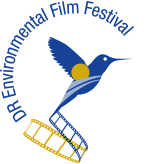Centro León also hosted a panel of experts after the screening.
Santiago de los Caballeros, September 11th, 2014. Centro León was the venue for the screening that kicked off the IV Dominican Republic Environmental Film Festival in the city of Santiago de los Caballeros, the second largest city in the Dominican Republic, during the evening of Thursday, September 11th. Filmmaker Denis Delestrac, who made the documentary film Sand Wars, opened the program of the event in a spectacular manner before an enthusiastic audience. The screenings in Santiago will extend until this coming Sunday, September 14th. The President of Green Planet Films and distributor of the film, Suzanne Harle, came from San Francisco, California, USA, to participate in the event and respond to questions from the audience during a discussion panel that was held after the screening. Engineer Domingo Rodríguez, Santiago’s Provincial Director of the Environment, also participated in the discussion.
The opening ceremony was attended by Luis Felipe Rodríguez, Manager of Cultural Programs at Centro León, and by José de Laura, in charge of Centro León’s Cineforum, both of whom gave the floor to Miryam López, GFDD/FUNGLODE representative.
The public of Santiago received with great enthusiasm the screening of the documentary film, which portrays a shocking picture of the predictions of a growing number of scientists and environmental NGOs, that, at the end of the 21st century, the beaches will be a thing of the past. The film explains how today sand is a vital resource for our modern economies, which makes it the most consumed natural resource on the planet after fresh water, and how its extraction may lead, in a not too distant future, to the destruction of our coastal areas and beaches.
After the screening, some viewers expressed their astonishment at the information provided by the film. “I am in shock,” or “this film has changed my life,” were some of the comments that were heard among the audience.
During the panel, Suzanne Harle referred to the three main reasons that are causing the loss of sand in the Dominican Republic: hurricanes, the loss of coral reefs and the use of sand by the construction industry. However, she underscored that developing countries such as the Dominican Republic still have time to curb the serious problems that the extraction of sand from the beaches are causing to the coastal and marine ecosystems and the environment in general, and highlighted the successful initiatives that governments and corporations around the world have launched thanks to this documentary film.
Meanwhile, Domingo Rodríguez made an exhaustive review of some of the major environmental issues that thrive today all over the beaches and river basins of the country. At the same time, he said that “Dominican tourism is not sustainable because it does not provide balance: there is no respect for the culture of the areas where tourism activity is concentrated or for the natural cycles that affect the environment. It is just a mere economic compensation that does not always include the communities in which it takes place.”
Santiago’s Provincial Director of the Environment added that the beaches of Bayahibe, Samaná, Cabarete, Gaspar Hernández, Sosua and Montecristi are some of those that, at present, display greater erosion in the country.
About the Film Festival
Dozens of films, panel discussions, dialogues and workshops are taking place in 10 cities around the country in the framework of the IV edition of the Dominican Republic Environmental Film Festival (DREFF), held from September 10th to September 14th, 2014.
Santo Domingo, Baní, San Cristóbal, Puerto Plata, Sosúa, Samaná, San Juan de la Maguana, La Vega and San Francisco de Macorís have made it possible for thousands of people to enjoy the complete programming of the fourth installment of the Film Festival on environmental issues, organized by the Global Foundation for Democracy and Development (GFDD) and its sister organization, Fundación Global Democracia y Desarrollo (FUNGLODE).
Venues such as the UNPHU, the Loyola College, the Monina Cámpora Cultural Center, Centro León, the Constanza Culture House, Hotel Villa Serena, the Perelló Cultural Center, among many others, have welcomed the screenings and special activities organized as part of the Dominican Republic Environmental Film Festival.
To keep abreast of all the latest news about the Film Festival, please visit: http://www.muestracinemedioambientaldominicana.org/noticias/
To view the pictures taken during the Film Festival, please visit: http://www.muestracinemedioambientaldominicana.org/fotos/


